Education
Gone but still lives on: Makerere University celebrates Prof. Kajubi’s legacy
Published
3 years agoon
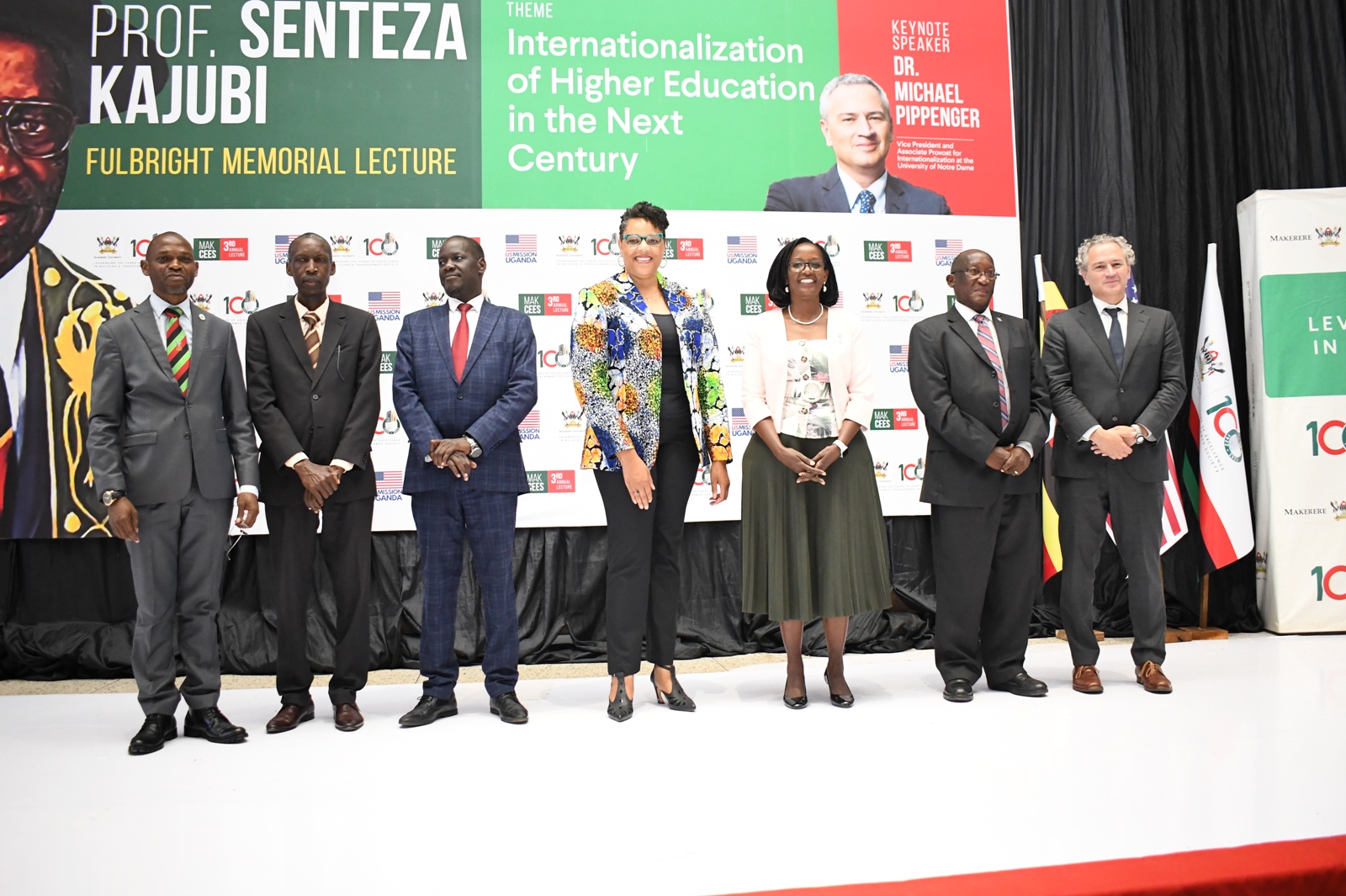
Professor William Senteza Kajubi, the first African to receive a Fulbright scholarship in 1952 and a renowned educationist who diversified and chaired a committee to review Uganda’s Curriculum in 1990 was remembered and celebrated by Makerere University College of Education and External studies (CEES) in a public lecture that happened on 22nd September 2022 at the Yusuf Lule teaching facility Auditorium at Makerere University.
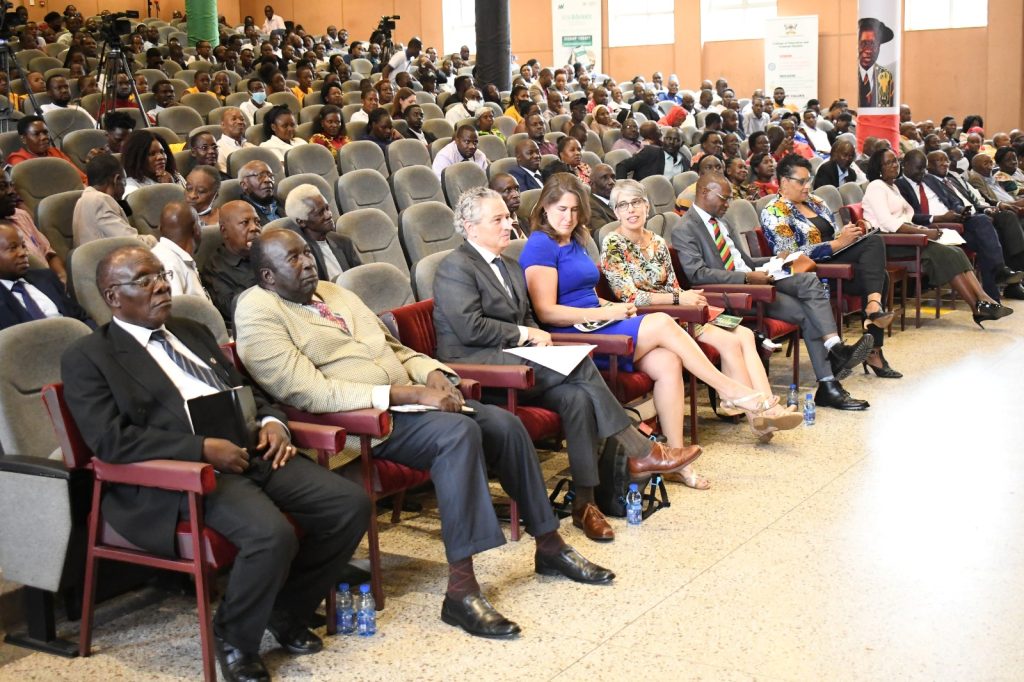
The ceremony themed “Internationalization of Higher Education in the next Century” presided over by the United States’s Ambassador to Uganda Her Excellency Natalie Brown brought together many academicians, educationists and students across the world to celebrate the life and achievements of the person of Professor William Senteza Kajubi. In attendance were Vice Chancellors from Ugandan universities e.g. Soroti, Muni, Bishop Stuart, Bugema, Ndejje and Busitema.
Besides remembering the life of Prof. Kajubi, this public lecture also happened to be marking the Makerere University’s 100 year anniversary, Uganda’s 60 years of independence and its fruitful relationship with the United States that has paved way for the Fulbright Scholarship program and many other partnerships that have impacted lives of Ugandans.
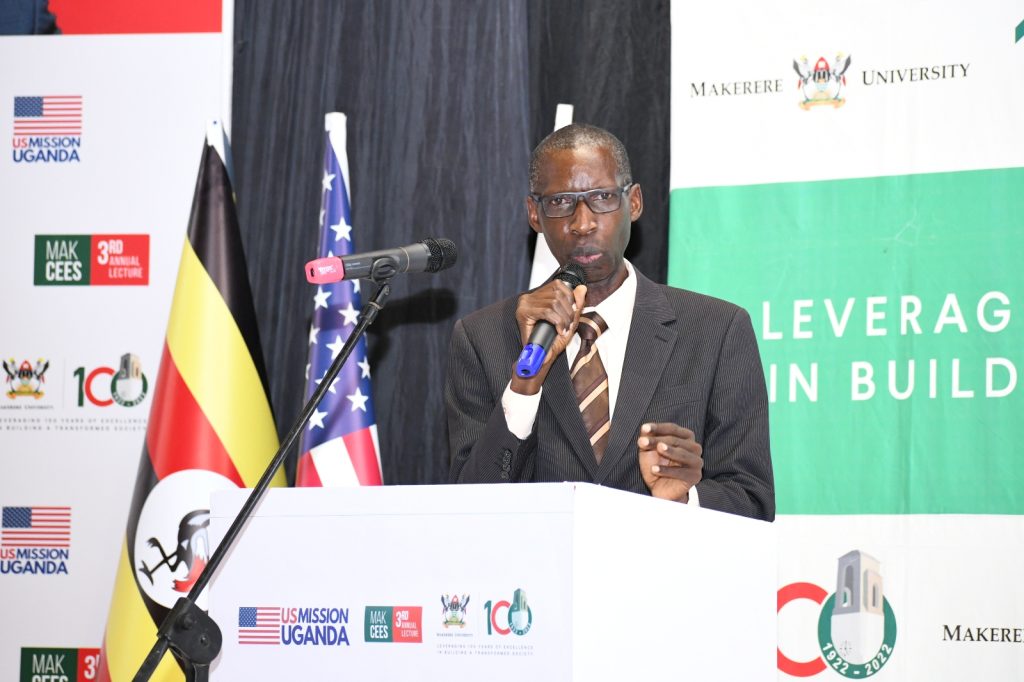
While addressing the congregation, the Principal College of Education and External Studies (CEES) Professor Anthony Mugagga hailed Professor Kajubi for the 1989 report on Education which the National Resistance Movement government incorporated into its 10-point program.
“In 1954 when Pope Leo the 10th appointed Ben Kiwanuka as the first African Bishop, he cautioned him to be successful so that he can inspire more African theologians. Kajubi never got lost in the States, neither did he do drugs but he clang to studies and paved way for other scholars of the Fulbright Scholarship program,” added Professor Mugagga who concluded his remarks cautioning the congregation to emulate Prof. Kajubi, and also thanked all staff who participated in seeing this event a success.
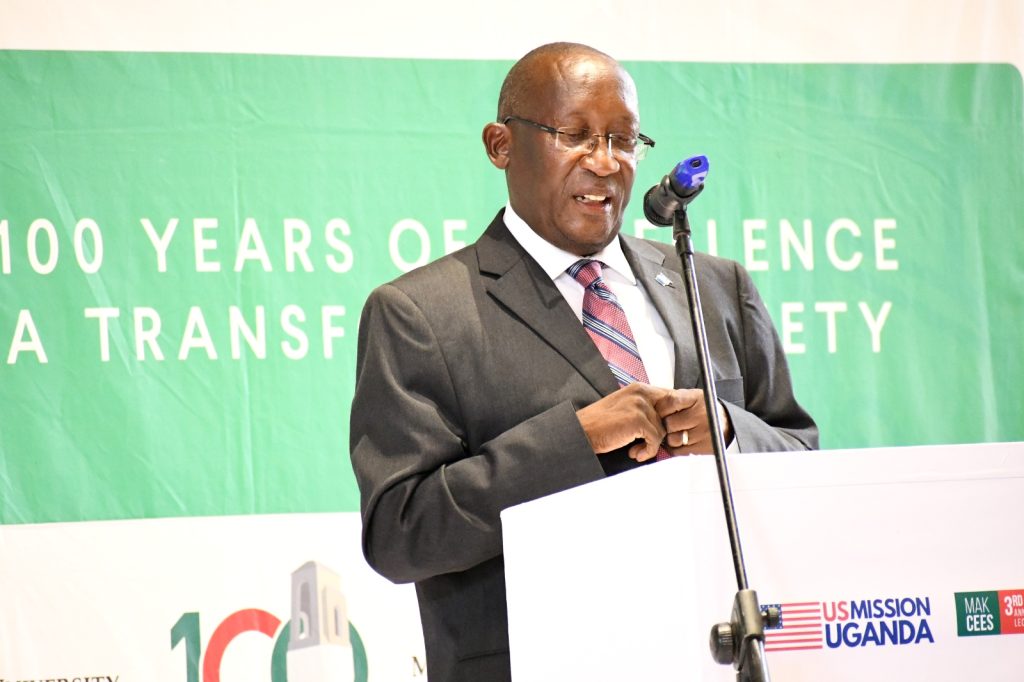
On behalf of the Senteza Kajubi family, his son Wasswa Kajubi expressed their deepest gratitude and honor to Makerere University and CEES administration for always remembering their loved one even when he passed on long time ago.
The Chairperson Makerere University Council Mrs.Lorna Magara highlighted how the Late Prof. Kajubi’s life symbolized hard work, persistence and courage to pursue excellence and greatness. She added that Prof. Kajubi’s passion for education at Makerere and the University of Chicago resulted into a lot of phenomenal education reforms that saw admission of private sponsored students to Makerere.
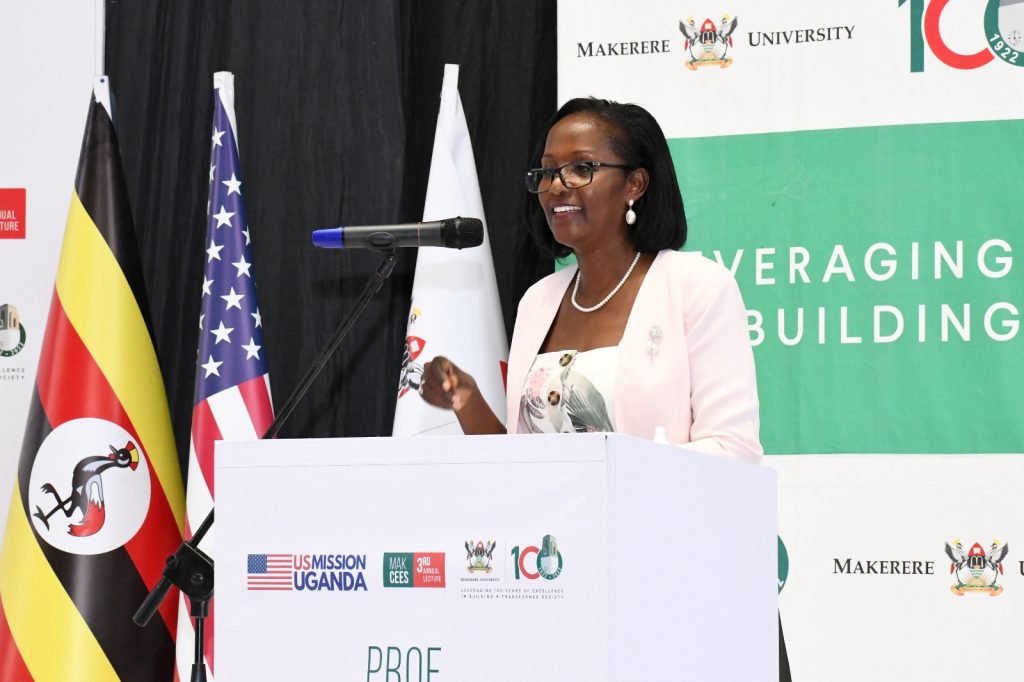
“Prof. Sentenza Kajubi’s life symbolized hard work, passion for the profession,
creativity, innovation, and courage to pursue and carry out a vision”. This hard work ethic, Mrs. Magara informed the gathering, was reinforced daily by a family motto in the Kajubi sitting room, “OMULIMU LYE LINNYA LY’OMUNTU,” which may be translated as ONE’S WORK IS ONE’S NAME.
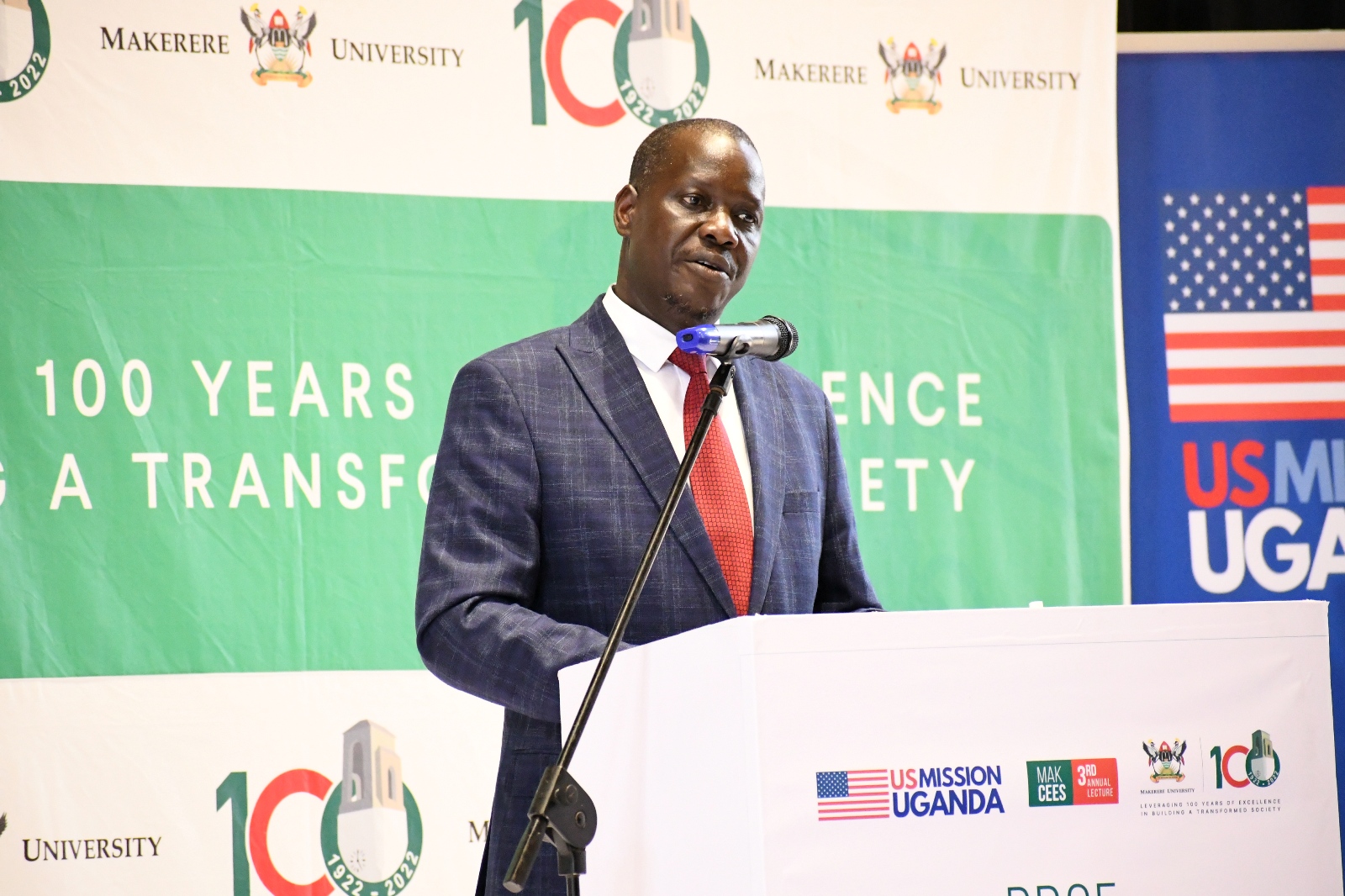
The late Prof. Kajubi’s passion and pursuit for knowledge can be traced through his education journey, from Mengo Junior Secondary school to Kings College Budo, to Makerere University, and on to the University of Chicago on a Fulbright Scholarship graduating with an MSC. with a concentration in Geography. Upon return, he embraced the privilege and honor of serving as a teacher, and Administrator. His dedicated service saw him rise through the ranks to serve as Director, National Institute of Education (1964- 1977) and twice as Vice Chancellor, Makerere University (1977-1979; 1990-1993).
Her Excellency Natalie Brown the United States Ambassador to Uganda said,” Professor Kajubi is a shining star among Fulbright alumni, in Uganda and beyond. He traveled to the U.S. in 1952 as a Fulbright student to pursue a master’s degree at the University of Chicago. He returned to make great contributions to the education sector in Uganda and the region. His two-time tenure appointments at the helm of this university demonstrate his outstanding leadership ability”. Professor Kajubi did not limit himself to education alone, he went on to serve as a delegate to Uganda’s Constituent Assembly which created the new constitution in 1995, among other things. His legacy of service to his country remains an inspiration to generations of faculty and students alike”.
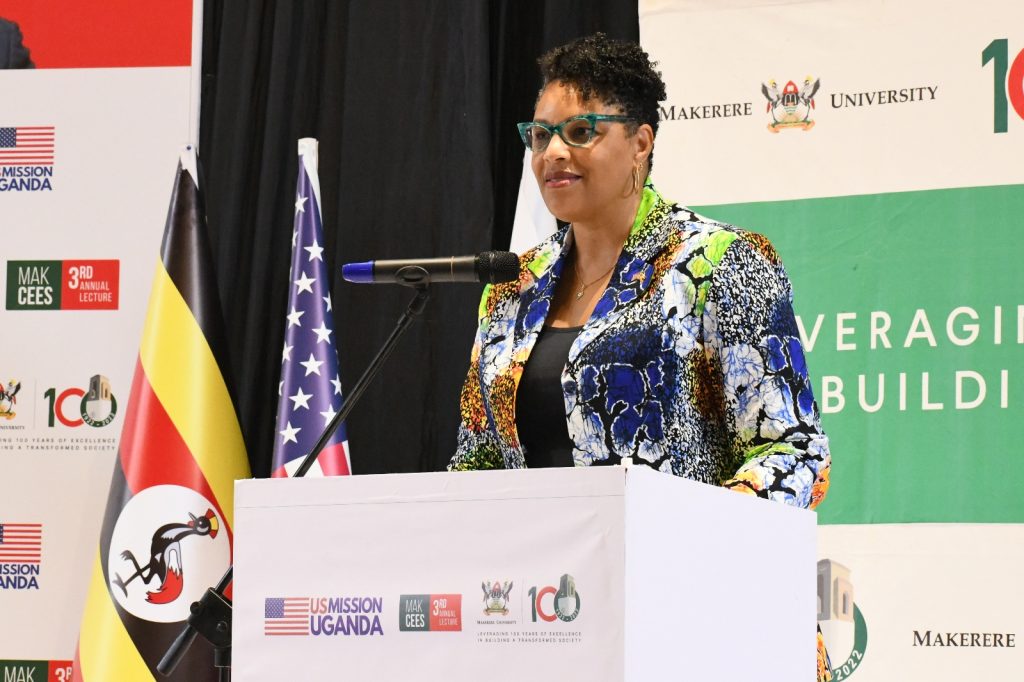
Ms. Brown said the US Mission in Uganda are proud to manage the Fulbright program in Uganda where 12 Ugandan Fulbright grantees were sent this year to academic programs for Masters, PhD and research in the United States, and in exchange Uganda welcomed nine U.S. Fulbrighters to conduct research.
Makerere University and the people of America have had great partnerships that have seen America’s public Health enthusiasts and other specialists come to Uganda to conduct research. They include the National Institutes of Health (NIH), the U.S. Centers for Disease Control and Prevention (CDC), President’s Emergency Plan for AIDS Relief (PEPFAR), and so many others.
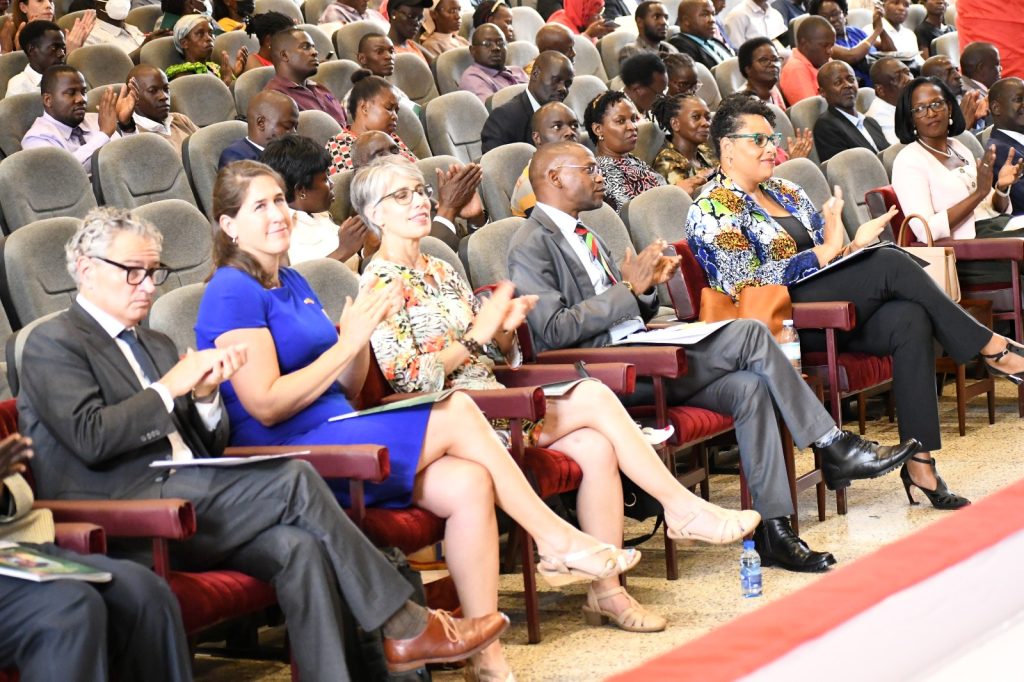
The keynote speaker of the day and the Vice President and Associate Provost for Internationalization at the University of Notre Dame, Dr. Michael Pippenger challenged African Universities to ensure solidarity, commitment and transparency if they actually want to internationalize since it not only helps them realize weaknesses, strengths and potential areas of collaboration but also builds transformative and global minded students.
“It is not the MOUs and agreements we sign that show internationalization, but rather the work we do while together on ending pandemics, fostering rule of law and other community impactful engagements. Surprisingly Prof Kajubi knew all this”. Concluded Dr. Pippenger who urged universities to stick to their visions and missions which should reflect on the communities they serve.
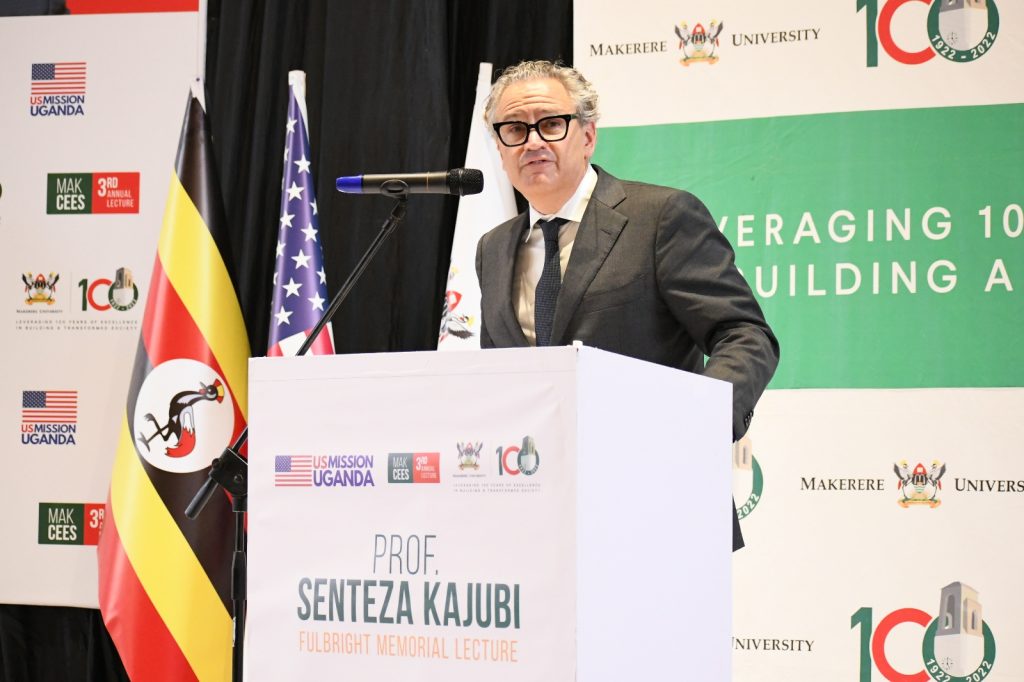
Prof. William Senteza Kajubi served as the Vice Chancellor of Makerere University at two different intervals 1977 – 1979 and 1990 – 1993. He was also a member of the constitutional Assembly that drafted Uganda’s constitution of 1995. He devoted his life to Academics and impacting communities until his death on May 1st, 2012.
Background
Prof. Senteza Kajubi was born in 1926, in Singo county (modern day Mityana District), to Yoweri Bugonzi Kajubi and Bulanina Namukomya. His family later moved closer to the capital and settled in Busega, a suburb in the outskirts of Kampala, where he began his long journey with, or rather in, education at the Mackay Memorial Primary School in 1933. He then attended Mengo Junior School from 1941 to 1943 before transferring to King’s College Budo for his Advanced Level, finally making it to Makerere College in 1947 where he pursued a Bachelor of Arts with a Diploma in Education.
Shortly after he graduated, Prof. Kajubi taught at Kako Junior Secondary School before going to the University of Chicago for a Master of Science in Geography. Later, in 1955, he went back to his alma mater, King’s College Budo, and taught Geography. It was during this period that he taught other notable personalities in Uganda’s history such as Mathew Rukikaire and Prof. Apolo Nsibambi in a predominantly white environment. The only other native teachers at Budo, then, were the Deputy Headteacher, Mr. Sempebwa and Erisa Kironde, an English language teacher.
As one of the few Protestant members of a predominantly Catholic Democratic party (DP), Senteza Kajubi was a member of the National Symbols Committee which was tasked with selecting the national anthem, flag and coat of arms.
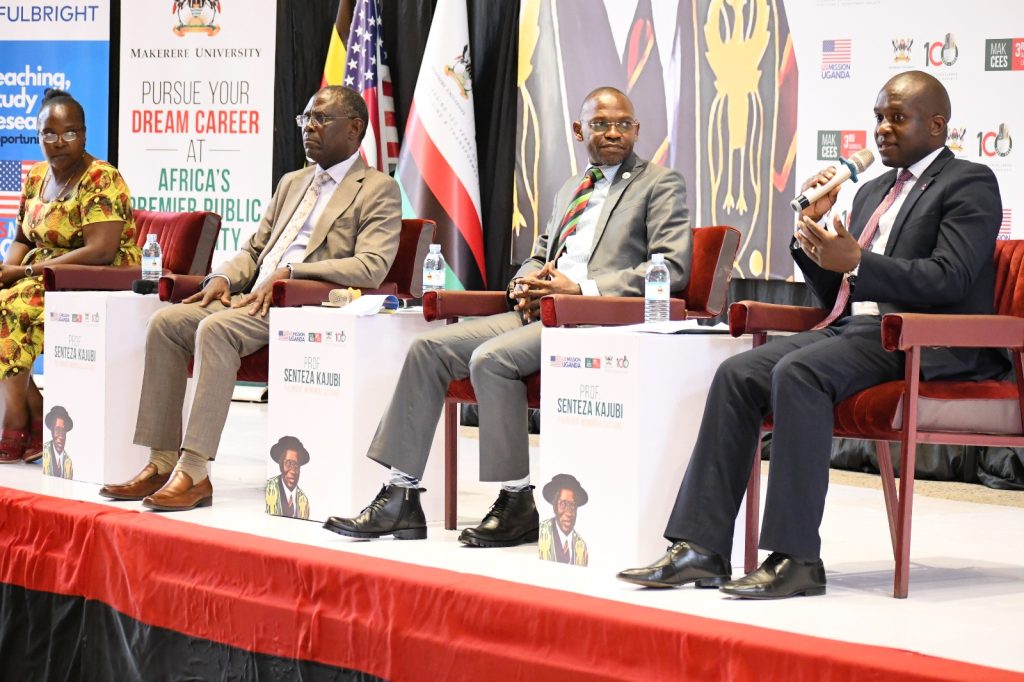
His political acumen propelled him to chair a number of government boards over the years until he directly participated in electoral politics in 1994 as a delegate of the Constituent Assembly representing Kyadondo North.
Two years after Uganda got independence, now a lecturer at Makerere University, Prof. Senteza was appointed the Director of National Institute of Education. He served there until 1977 when he became Vice Chancellor for the first time.
Education Policy Formation in Uganda
As the Secretary General of the Uganda Teachers’ Association from 1959 to 1962, Prof. Senteza Kajubi was a member of the famed Castle Commission on Uganda’s post-independence education policy framework.
Instituted and appointed in January 1963, the Castle Commission had been tasked with examining the content and structure of education in Uganda in light of the approved recommendations of the International Bank Survey Mission Report, Uganda’s financial position and its future manpower requirement.
In the execution of its mandate, the commission dealt with a dilemma; if the formulated policy disproportionately focused on universal primary education and adult literacy while neglecting secondary, tertiary and higher education, it would fail to produce high level manpower which was required to staff government and teach in schools. However, on the other hand, the country did not have the resources to make improvements across the board and had to prioritise one option to the detriment of the other.
Since Makerere was still under the University of East Africa and higher education was still an inter-territorial responsibility, the commission instead focused on prioritising teacher-training, expanding secondary school enrolment and improving relevance, quality and access of primary education in remote areas.
In 1977, during his first tenure as the Vice Chancellor of Makerere University, Prof. Kajubi went on to chair the Education Policy Review Commission (EPRC) which was appointed by Idi Amin’s Minister of Education, Brig. Barnabas Kili.
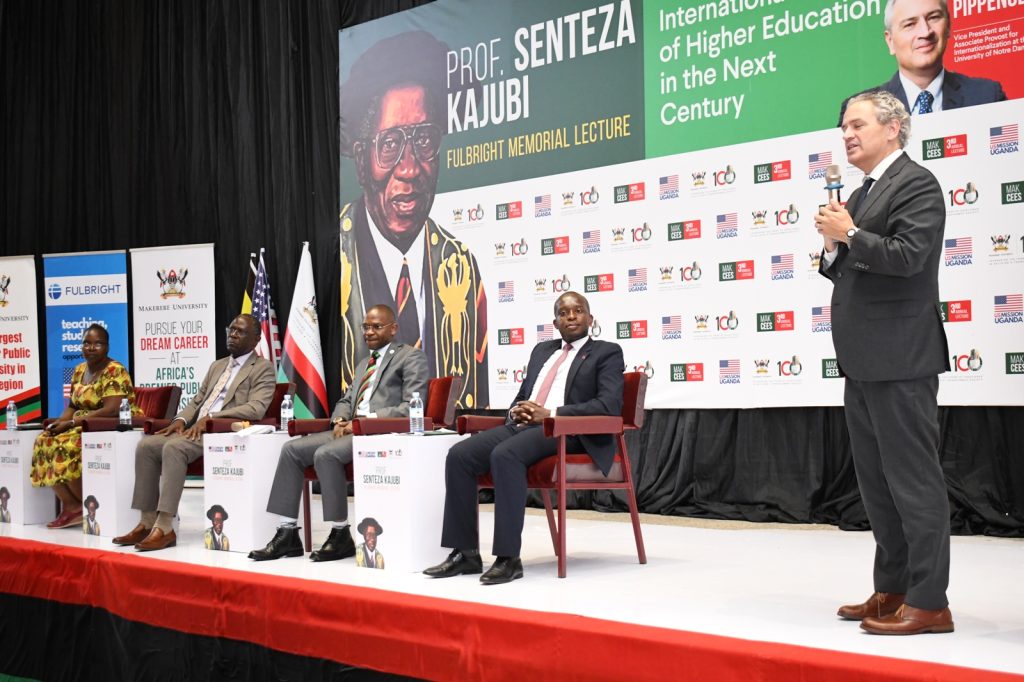
Owing to the political climate at the time, the education system was facing even dire problems. The gross human rights violations had led to a mass exodus of highly qualified professionals from civil service, teachers and university faculty into exile. Imploding diplomatic relations rendered external assistance with regard to education inexistent and the government had to deal with shortages from personnel to instructional material.
Prof. Senteza Kajubi was then tasked with the responsibility of leading an effort to circumvent some of these challenges and therefore keeping the education system in Uganda alive. Unfortunately, the findings and recommendations of the report, from its members and constituent sub-committees were overtaken by events in 1979 when war broke out and the Idi Amin regime was overthrown. The report was shelved and never formally presented to cabinet.
In 1987, after the ascendancy of the NRM government into power, another commission, once again headed by Prof. Senteza Kajubi, was appointed. Still under similarly unique circumstances, this commission too had to work within the socio-economic confines of a post-war society riddled with scarcity of resources. Eighteen months later, the commission’s report was produced in January 1989.
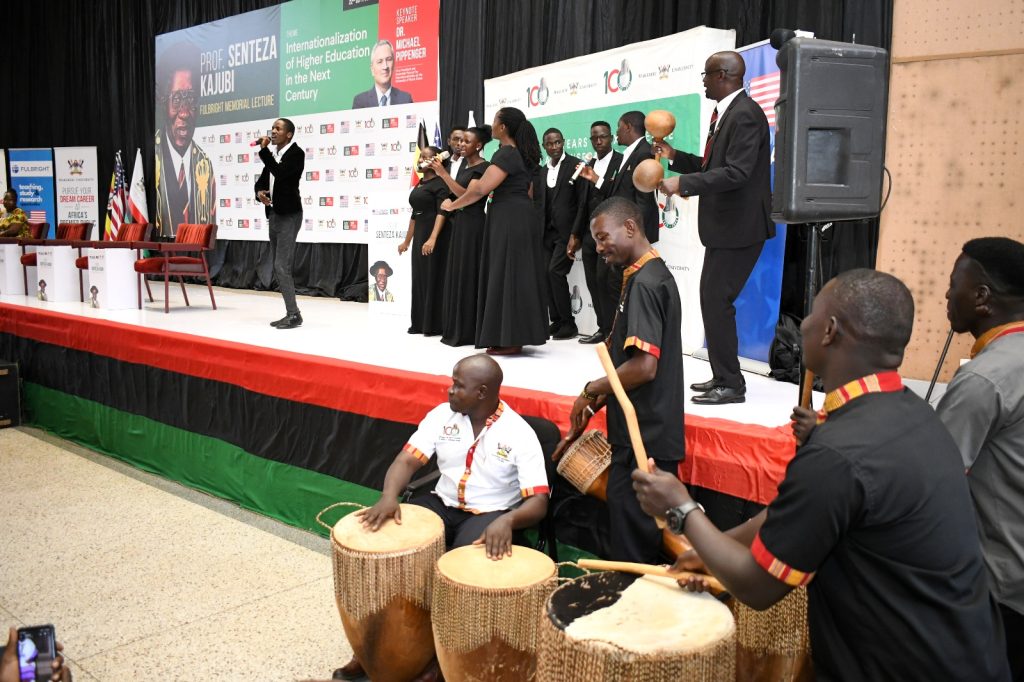
The most notable outcome of this committee report was a government white paper which brought to life the famous Universal Primary Education. This recommendation alone, for all its limitations, has contributed significantly to literacy levels in Uganda and to the education system as a whole.
After chairing the second Kajubi commission, he then became the Vice Chancellor of Makerere University for the second time, from 1990 to 1993, preceded by Prof. George Kirya and succeeded by Prof. John Ssebuwufu.
The Fulbright Program
In 1952, Prof. Senteza went on to the University of Chicago, on a Fulbright Scholarship, to pursue a Master of Science in Geography, making him the first African beneficiary of this scholarship program.
The student exchange scholarship program, which was started shortly after the Second World War by an act of Congress, was named after the American Senator J. William Fulbright, its framer. He made the case that “educational exchange could turn nations into people, contributing as no other form of communication can to the humanising of international relations.”
Through his notable achievements and illustrious career, it is clear that this initiative to bridge cultural gaps through an international education exchange program had Prof. Senteza as one its successes.
You may like
-
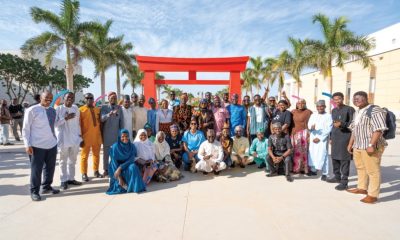

Call for applications: E-JUST TICAD8 African MSc. Scholarships
-
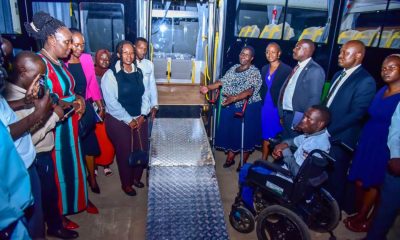

Makerere University commemorates International Day of Persons with Disabilities: Emphasizes Disability-Inclusive Programmes
-
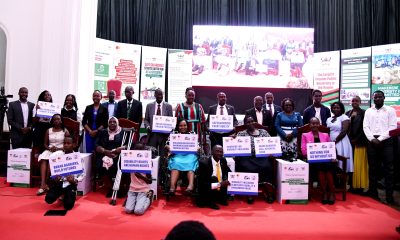

Reflecting on Strides made in Championing Inclusive Education
-
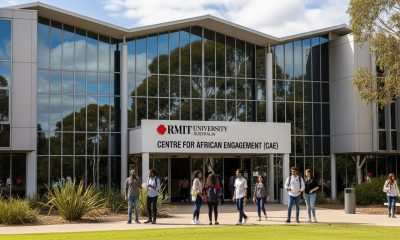

RMIT Centre for African Engagement (CAE) PhD Scholarships
-
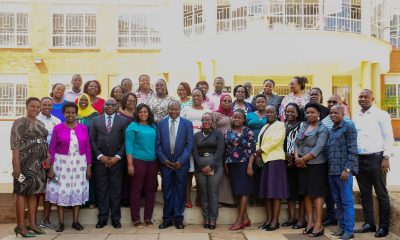

Makerere University Writing Centre holds second training workshop: Roots for standard University-wide templates in minute writing
-
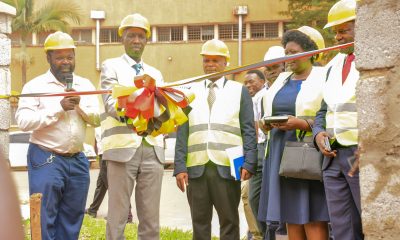

Real life project: Makerere University Vice Chancellor hands over constructed Wall Fence to Makerere College School
Education
Facilitating Access and Participation through Higher Education Access Programmes and Connected Education for Students with Refugee Backgrounds: A Global South Delphi Study
Published
1 month agoon
December 19, 2025
On 17th December 2025, a Delphi workshop was convened at Kampala Kolping Hotel, providing a collaborative platform for dialogue on standardisation and harmonisation of Higher Education Access Programmes (HEAP) across institutions, alongside strategies for portability and verification on demand through a HEAP Digital Passport. Discussions centered on accreditation, diversification of delivery and learner support, and future scenarios for HEAP and Connected Education.
Expert panelists underscored the urgent need for:
- Standardised HEAP frameworks across universities to ensure consistency in admission pathways.
- Harmonisation of HEAP curricula, duration, and procedures to eliminate barriers that hinder access and transition.
- Development of a HEAP Digital Passport enabling portability of credentials, secure digital verification, and integration with national qualification frameworks and international recognition systems.
Uganda, is one of the leading refugee-hosting countries with inclusive education policies, faces challenges in ensuring equitable access and participation for students with refugee backgrounds. While some universities offer HEAP as a bridging programme for marginalized learners, variations in programme design, delivery, and support systems still exist, which may lead to violations of accreditation. This calls for urgent standardisation and harmonisation to strengthen HEAP as a recognized transitional pathway into higher education.

Funded by Education Beyond Borders, researchers from Makerere University and the University of Edinburgh engaged stakeholders from public and private universities in Uganda through participatory workshops and expert meetings. This Delphi Workshop aimed providing a collaborative platform for dialogue on standardisation and harmonisation of Higher Education Access Programmes (HEAP) across institutions, alongside strategies for portability and verification on demand through a HEAP Digital Passport. Discussions centered on accreditation, diversification of delivery and learner support, and future scenarios for HEAP and Connected Education. The project is led by Dr. Rovincer Najjuma (Principal Investigator), with co-PIs Dr. Rebecca Nambi and Dr. Michael Gallagher.
Listening to experiences and co-creating solutions

Opening the workshop, Dr. Rebecca Nambi, a Senior Lecturer at Makerere University and Co-Investigator of the project, emphasized that the engagement was not about formal presentations, but about listening to experiences of students with refugee backgrounds that have accessed Higher Education using the HEAP programme and co-creating solutions with Expert Panelists.
Highlighting the persistent disparities in refugee participation in higher education, Dr. Nambi explained that while global and national efforts often focus on primary and secondary education, higher education remains critically under-supported. Drawing on years of research, she observed that refugee participation in higher education has historically stood at three percent (3%), later improving to about seven percent (7%), leaving the highest number of refugees excluded.
“Where do they go if they do not transition to higher education?” she asked. “Who supports them and how do institutions respond when learners arrive with disrupted educational trajectories?”
Shift from mere documentation of marginalization and adversity to practical interventions
Dr. Nambi underscored the importance of moving beyond research that merely documents marginalizationa and adversity. She advocated for practical interventions that improve systems for people with refugee backgrounds and strengthening education for host communities. “Addressing refugee education is part of a broader global agenda shaped by migration, conflict, and labour mobility in several countries.”
Dr. Nambi emphasized that HEAP provides a legitimate pathway for students with refugee backgrounds, and the ongoing adjustments aim to align the program with national standards and student needs.
Central to the discussion was the concept of connected learning, which promotes flexible, blended, and digitally supported education pathways that link learners across institutions, resources, locations, and systems.
Referencing the Makerere University E-Learning Environment (MUELE) as a key enabler of digital and interactive learning between lecturers and students at Makerere University, Dr. Nambi urged other universities to explore such a digital approach to catalyze the delivery of HEAP programmes. She noted that connected education is not solely about technology, but about harmonization, recognition, and collaboration among universities and regulators.
Comparing public and private universities, Dr. Nambi observed that private universities often have more flexible access pathways, and urged that documentation of students’ experiences of HEAP is critical to understanding gaps in provision, delivery and support
“Much of our work has involved examining how Makerere University and other universities are handling access for vulnerable students. We want to document lived experiences, analyze what is working and what is not, and generate evidence that can inform policy and institutional practice,” Dr. Nambi explained.
HEAP Emerging Challenges, lived experiences and future
Moderating one of the key sessions, Dr. Rovincer Najjuma, the Principal Investigator and a Lecturer in Digital Education and the Global South at the University of Edinburgh, guided participants through delphi workshop activities; these included engaging panelists in articulating expectations, uncertainities and risks, and developing future scenarios for HEAP accreditation, diversification of delivery and support and connected education.

Using participatory methods, participants shared insights through post-it notes and group reflections, capturing perspectives from expert panelists, HEI administrators, and students with refugee backgrounds. Dr. Najjuma encouraged an open dialogue, ensuring that student voices, particularly those with refugee backgrounds were centred in the conversation by encouraging them to share their experiences and journeys of participating in HEAP programmes.
The panelists acknowledged that while the HEAC has changed the nomenclature from HEAC to HEAP, programmatic provisions need to evolve, to address the inconsistencies that remain with respect to how institutions implement HEAP, duration, curriculum, and transfer of HEAP credit across institutions. Panelists shared about the critical gaps in awareness, mentorship, orientation, and institutional readiness to implement HEAP in ways that support refugee learners effectively.

On the issues faced by students with refugee status, participants identified several recurring challenges affecting access to and participation in higher education. These included low awareness of the HEAP programmes, fragmented and uncoordinated information dissemination, and difficulties in credential recognition and transfer across institutions and country host-country education systems.
Students highlighted low self-esteem, identity struggles, and stigma, especially where access programmes are perceived as inferior to Advanced High School Certificates. They also cited financial barriers, limited digital access, mental health challenges, and lack of learner-centred teaching approaches.
Key outcomes from the workshop
Panelists outlined key expectations to strengthen access and participation, which included the development of a standardized national HEAP curriculum, with clear and uniform entry requirements, and seamless credit transfer across institutions and host countries, facilitated by the development of HEAP Digital Passport.
Mentorship emerged as a cornerstone of learner support, alongside extended orientation programmes, life skills training, and entrepreneurial education. Participants emphasized the need for blended and online learning, supported by affordable internet access and institutional investment in digital infrastructure.
Policy coherence, stakeholder engagement in policy formulation, and timely communication of reforms were identified as essential for successful implementation. Participants called for gender-sensitive curricula, student representation structures, humane and trauma-informed teaching staff, and adequate learning resources, including reference materials.
HEAP: A Structured Pathway to Higher Education
Dr. Gidraf Joseph Wanjala, Principal of the College of Education, Open and Distance Learning at Kampala International University, highlighted the evolution of access programs in Uganda.
“Historically, the higher education access framework was known as the Higher Education Access Certificate (HEAC). Last year, it was updated to the Higher Education Access Program (HEAP), reflecting a shift from a certificate to a full program, approved by the Ministry of Education and Sports,” Dr. Wanjala said.

He explained that HEAP provides structured pathways for students to progress from diploma to bachelor degree levels, from mature entry to degree programs, and from senior secondary school to higher education. “This program is inclusive of refugee students and all marginalized groups, provided there is funding and space. HEAP supports students not just academically, but also through orientation programs, mental health training, reproductive health education, and gender-responsive support,” Dr Wanjala stated.
Challenging Misconceptions

Dr. Derrick Ssekajugo, Chair of the Special Purpose Committee on Academics and Acting Principal of the College of Economics and Management at Kampala International University, addressed public misconceptions about HEAP.
“Some perceive HEAP—or previously HEAC—as only for students who could not succeed in secondary school. That is not the case. For instance, we have students who initially studied Education but through HEAP transitioned into medicine. Today, they are fully qualified professionals,” Dr. Ssekajugo said.
He also highlighted the pedagogical shift from teacher-centred to learner-centred approaches in secondary education and the need for universities to adapt. “Students entering HEAP come with diverse learning experiences, and universities must adjust to integrate them effectively into competency-based programs,” he noted.
Dr. Ssekajugo added that benchmarking with both local and international institutions is critical to identify gaps and best practices, which inform ongoing program improvements and policy reforms.
HEAP and standardization, accessibility and inclusivity
Sharing their vision for HEAP, panelists recommended standardization, accessibility, inclusivity and foundational nature of HEAP. They advocated for a competence-based HEAP, with a standardized curriculum, offline and online access to resource books and materials, diversification of delivery and support through blended learning and a HEAP Digital Passport for portability and verification on demand.
Education
Real life project: Makerere University Vice Chancellor hands over constructed Wall Fence to Makerere College School
Published
3 months agoon
November 13, 2025
By Ritah Namisango and Harriet Musinguzi
On 12th November 2025, Makerere University officially handed over a newly constructed wall fence to Makerere College School. The real-life project was executed by technical students pursuing higher diploma courses in Civil Engineering and Architecture under the Uganda Vocational and Technical Assessment Board (UVTAB). The students are enrolled at the Centre for Lifelong Learning and Teaching, which operates within the College of Education and External Studies (CEES) at Makerere University.
The Centre for Lifelong Learning, in partnership with UVTAB, is involved in implementing real life projects within the communities-a practical approach that ensures that students identify problems within the community, hold collaborative discussions, and come up with projects to solve the problems.
The handover ceremony of the newly constructed Wall Fence was witnessed by key stakeholders that included officials from UVTAB, the College of Education and External Studies (CEES), the College of Engineering, Design, Art and Technology (CEDAT), the leadership of Makerere College School, UVTAB Deputy Executive Secretary and the technical students pursuing the higher diploma in Architecture and Civil Engineering.

The Vice Chancellor of Makerere University, Prof. Barnabas Nawangwe, represented by the Principal of the College of Education and External Studies, Prof. Anthony M. Mugagga, expressed heartfelt gratitude to Dr. Martin Muyingo, Head Teacher of Makerere College School, for providing a valuable learning space to students under the lifelong learning and teaching program. He acknowledged Prof. Dorothy Okello-Chairperson of the Uganda Vocational and Technical Assessment Board (UVTAB), Prof. Moses Musinguzi-Principal of CEDAT, course instructors, and students for their commendable contributions. He noted that the newly constructed wall stands as a testament to the power of lifelong learning and practical teaching.
The Vice Chancellor commended the management and staff of the College of Education and External Studies (CEES) for implementing programmes through the Centre of Lifelong learning, which are aligned to the Makerere University’s Strategic Plan. He observed that the partnership with UVTAB increases the number of students accessing quality education services, enhances lifelong learning, promotes practical education, and contributes to community transformation.

Congratulating the technical students upon this milestone, and in solidarity, the Vice Chancellor wrote: “I am an architect and courses in my profession go deep to my heart. Congratulations to the students, the engineers, and course instructors.”
Prof. Nawangwe emphasized the importance of architecture-related courses and praised Makerere’s longstanding commitment to student-centered learning, innovation, and thought leadership principles that have guided the university for over two decades. He highlighted that Makerere’s strategic direction aligns with Uganda’s National Development Plan IV and Vision 2040, which advocates for inclusive, equitable, and lifelong education. This vision, he said, reflects the aspirations of His Excellency President Yoweri Kaguta Museveni and the Government of Uganda’s education agenda.
He explained that the Centre for Lifelong Learning (CLL) at CEES, serves as a bridge between the university and the community. It offers opportunities to Ugandan youth and individuals who lack the financial means or academic qualifications to access Makerere’s mainstream programs, to join UVTAB technical education programmes, with instructors at Makerere University Centre for Lifelong Learning. Students enrolled in the program typically come from A-level backgrounds or hold certificates from technical institutions.

He highlighted that long before the Government of Uganda, through the Ministry of Education and Sports, restructured the secondary school curriculum to embrace competence-based teaching and learning, Makerere University had already been championing student-centered education. For over two decades, the university has promoted innovation, experiential learning, and thought leadership.

Ms. Jalia Nassaza, the Acting Deputy Executive Secretary of the Uganda Vocational and Technical Assessment Board (UVTAB), emphasized the importance of real-life projects within the Technical and Vocational Education and Training (TVET) curriculum. She explained that these projects enable students to identify community challenges, engage in collaborative discussions, and develop practical solutions ultimately shaping them into holistic professionals. Through this approach, learners gain essential skills in planning, teamwork, and applying theoretical knowledge to real-world scenarios. Ms. Nassaza emphasized the need for an education system in Uganda that equips students to solve local problems and improve their surroundings. “We want to make our education realistic by translating knowledge into solving problems,” she affirmed.

The Principal of the College of Engineering, Design, Art and Technology, Prof. Moses Musinguzi while congratulating the students upon the completed wall fence structure and other projects, noted that as professionals, scientists get a lot of public criticism because they are the core of providing solutions to societal problems. He said the commissioning of the fence was testimony that the university in partnership with UVTAB, was teaching students ways of solving problems around them. He said that as a college, CEDAT provides access to the required infrastructure in the labs, workshops, and studios, as well as technicians who support the teaching.
Prof. Musinguzi said Makerere University was considering a revision of the assessment, making continuous assessment total to 60%, while classwork is rated at 40%. He also mentioned the CEDAT model, whereby the university was considering utilizing students in technical subjects to support the Estates and Works Department in infrastructural maintenance and service works instead of hiring externally, and that students on both Diploma and Degree programs would be engaged. ‘We need to see scientists directly engaged in the development of the country,’ he emphasized.

Speaking on behalf of the instructors, Mr. Barnabas Mabonga highlighted some of the students’ requirements that included the need for basic tools, providing opportunities for their academic progression to degree programs, and strengthening the safety measures. Some of the actual projects that the AVTAB technical students under CEES and CEDAT have worked on at Makerere College School include: a yard constructed at the boys’ hostel, the wall fence, and a drainage system. He said 173 students out of whom 28 are girls, were enrolled in the Civil Engineering and Architecture higher diploma program. He informed the Vice Chancellor and other guests present that the students in the real-life learning and teaching programs were excelling in performance, with a pass rate of 99%.

Dr. Oscar Mugula, Coordinator of the Centre for Lifelong Learning, emphasized the value of community engagement in their academic programs. He noted that the partnership with Makerere College School began two years ago, when students from the center undertook repair works on the school’s infrastructure. The collaboration has proven mutually beneficial, with the beneficiary school experiencing reduced development costs, while students, particularly those studying technical drawing, gained hands-on experience through the perimeter wall project, which contributed to their coursework and project assessments for the year.
In partnership with UVTAB, the Centre for Lifelong Learning offers diploma courses in Civil Engineering, Architecture, and Electrical Engineering. The students pursuing these courses are examined and accredited by UVTAB. Students benefit from experiential learning at CEDAT, where they are encouraged to innovate using affordable, locally sourced materials. They are also placed in real-world workstations and garages to observe best practices and avoid unethical conduct. Graduates of the program either join the workforce or continue their academic journey at the university.

The Center for Lifelong Learning at CEES is charged with the duty to take the university to the community, providing opportunities to Uganda’s youth and persons interested in technical education, who may not have the requisite funds or grades to join the university’s degree programmes. The students on the program are either directly from A-level or other technical institutions.
Education
Digital Education: CEES holds stakeholders’ workshop to inform curricula for Postgraduate Diploma in Education (Online Track)
Published
3 months agoon
November 7, 2025
November, 4th 2025: Makerere University through the College of Education and External Studies, has been offering the Postgraduate Diploma in Education (PGDE) following the face-to-face delivery model.
In addition, to the physically taught Postgraduate Diploma in Education, the College of Education and External Studies, embarked on a process of curriculum development, for the online delivery model (PGDE-online).
This strategic option presents learners with a choice to either enroll for the physically taught (face to face) or the online Postgraduate Diploma in Education.
The introduction of the online mode of delivery for the Postgraduate Diploma in Education was informed by wide consultations, which revealed that many working adults including teachers, and distant learners, who wished to study the programme, were unable to attend. Engagements with such prospective applicants, called for the online delivery option.
To address this challenge, in March 2024, the College of Education and External Studies, embarked on developing the curriculum for the online option. The PGDE (online track) will be delivered on the Makerere University eLearning Environment (MUELE).
According to staff at the College of Education and External Studies, the online delivery model will enable learners to study remotely while acquiring modern pedagogical and digital skills essential for the 21st century education.
College hosts Stakeholders’ workshop to enrich curricula for the online delivery option:
On 4th November 2025, the College of Education and External Studies hosted a stakeholders’ workshop to enrich the curriculum document.
The workshop brought on board various stakeholders, including representatives from the Ministry of Education and Sports (MoES), the National Curriculum Development Centre (NCDC), the Department of the Academic Registrar, Directorate of Graduate Training, former students of the College who studied the Postgraduate Diploma in Education (face-to-face), staff from other units within Makerere University, and representatives from other education institutions including Ndejje University, Uganda Christian University-Mukono, and Uganda Martyrs’ University-Nkozi.
Remarks by the Head of Department:
Welcoming the participants, Dr. Genza Gyaviira Musoke, the Head of the Department of Foundations and Curriculum Studies thanked the stakeholders for accepting to dedicate time, to participate in the workshop. He called upon the stakeholders to suggest strategies aimed at ensuring that the PGDE delivered though the face-to-face model blends and complements the proposed online track.
College Principal emphasizes digital pedagogies:

The Principal, notified the stakeholders, that the College of Education and External Studies through the Institute of Open, Distance and e-Learning (IODeL), is credited for the operationalization of the Makerere University e-Learning platform (MUELE), which enabled online teaching and learning during the CoVID-19 pandemic.
Impressed by this milestone, the Vice Chancellor-Professor Barnabas Nawangwe, tasked the College of Education and External Studies, to come up with innovative teaching and learning pedagogies.
On this note, Professor Mugagga applauded the Department of Foundation and Curriculum Studies and the School of Education, for responding to the call from the Vice Chancellor, which has led to the development of the curriculum for the online delivery of the Postgraduate Diploma in Education (PGDE-online).
Emphasizing the trends in the education sector, he highlighted the technological demands presented by the Competence based curriculum (CBC), the National Teacher Policy of 2019, the Ministry of Education and Sports requirements for all teachers to be degree holders, and the need to embrace artificial intelligence (AI). He stressed that these reforms require teachers who are grounded in digital/online pedagogies, to nurture, teach and mentor, the next generation of students and teachers.
Presentation from the Director of Open, Distance and e-Learning:

Professor Paul Birevu Muyinda, underscored that the development of the online delivery of programs fits within the digital strategy for Uganda, launched by the Ministry of Education and Sports (MoES) in August 2024.
In line with the Ministry’s vision of increasing access to education, through the online delivery of the Postgraduate Diploma in Education, Makerere University is extending access to quality education services.
Professor Muyinda noted that the online delivery option, is aligned to the digital transformation agenda of the University, which is stipulated in the University’s Strategic Plan.
He acknowledged the Chairperson of the Committee, Dr. Harriet Najjemba, and her team for the valuable work, which has led to the draft curriculum, that the stakeholders had convened to discuss.
Opening the Stakeholders’ Workshop:

The Deputy Vice Chancellor (Academic Affairs), Professor Sarah Ssali, represented by Dr. Julius Kikooma, the Director of Graduate Training, commended the College of Education and External Studies, for the timely intervention, that will enable students to access quality education online. Noting that the evolution of academic programmes is within her mandate, Professor Ssali thanked the College for bringing on board various stakeholders, to provide valuable ideas.
Presentation of the proposed curriculum for the PGDE (online):

Presenting the proposed curriculum, Dr. Alfred Buluma from the School of Education highlighted the comprehensive design, online teaching and learning infrastructure for programme delivery, programme objectives and outcomes, core course units and electives, employment prospects, as well as, the availability of competent and technologically grounded staff to deliver the programme.
Dr. Buluma explained that the Postgraduate Diploma in Education (online) shall be a blended programme, heavily online, and with limited face-to-face interactions. He emphasized that Makerere University possesses adequate resources and infrastructure to support the program.
He acknowledged the involvement of staff from multiple departments: Humanities and Higher Education, Science and Technical Education, and Foundations and Curriculum Studies, alongside e-learning support staff.
Input from internal stakeholders:
Principal of the College:
Professor Anthony Muwagga Mugagga submitted that the proposed curriculum should embrace the ethical use of artificial intelligence (AI) in teaching and learning. He urged the participants to critically think about the delivery of experiments and practical classes online.
Reflecting on the remote areas in Uganda, where citizens do not have access to electricity and Internet, Professor Mugagga challenged the stakeholders, to bear in mind, the issue of inclusive education, and the possibility of delivery of online education, to teachers and students in such areas.
Directorate of Graduate Training:
Associate Professor Julius Kikooma, guided that the programme should strengthen the research capabilities of students/learners. He explained that the programme should provide a linkage to the research priorities stated in the Makerere University research agenda, as well as, the National Development Plan (NDPIV). As the team designs the curriculum, he encouraged them to study the University Senate guidelines document. He advised the team to include the knowledge areas, and learning outcomes. Citing the Graduate Students Handbook, Associate Professor Kikooma stressed the section on quality assurance that highlights the following competence areas: disciplinary knowledge, transferable skills, professional, and research competences.
Department of the Academic Registrar:

Stating its responsibility, the Senior Assistant Academic Registrar-Ms. Enid Kemari, who represented the Academic Registrar-Professor Buyinza Mukadasi, explained that the Department ensures that the proposed curriculum meets the standards set by the University and the National Council for Higher Education.
She referenced the Makerere University Policy on Open, Distance, and E-Learning, highlighting its main objective of increasing access to higher education through flexible learning modes. Ms. emphasized several key policy areas critical to the new online teacher education programme.
She commended the School of Education for aligning its program with national and institutional policies, noting that it will enable teachers, especially those already employed, to upgrade their qualifications without leaving their jobs. “It will contribute significantly to improving education quality in Uganda,” she said.
Plenary Session involving external stakeholders:

The plenary session provided the following recommendations.
- The online delivery should encompass the 21st century education expectations and demands of a learner and teacher.
- In addition, to increasing access to quality education, the curriculum document under the section “justification of the programme” should state the new areas in the education field, and the changed context under which teachers are operating.
- It should emphasize using the Makerere University e-Learning Environment (MUELE) in both teaching and learning.
- The curriculum should focus on developing the skills of learners (not only as those being taught), but also being empowered as learners to teach using the online delivery.
- There is need for retooling courses for both the teachers and learners as well as engagements on using artificial intelligence (AI) ethically.
Way forward:
Dr. Genza Gyaviira Musoke, highlighted that the input from stakeholders would be incorporated into the proposed curriculum. He briefed the participants that the proposed curriculum would be presented to the School of Education Academic Board, the College of Education and External Studies Academic Board, the University Senate and Council, and to the National Council for Higher Education.
Trending
-

 General2 weeks ago
General2 weeks agoPress Release: Semester II Set to Start 10th Feb, 76th Graduation Dates Confirmed
-

 General5 days ago
General5 days agoPress Statement: Makerere University Congratulates Former Staff and Students on Successful Election to Public Office
-

 Innovation2 weeks ago
Innovation2 weeks agoCall For Applications: Annual Innovation Commercialisation Award
-

 General4 days ago
General4 days agoPress Statement: Makerere 76th Graduation Ceremony
-
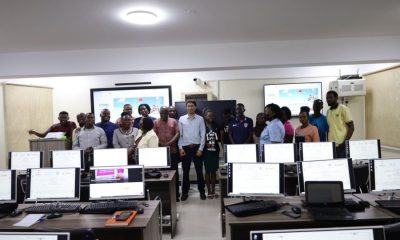
 Computing & IS2 weeks ago
Computing & IS2 weeks agoCoCIS CIPSD Short Courses Jan-Mar 2026
